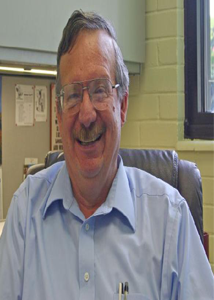Professor of Soil Science
Texas AgriLife Research
Weslaco
Dr. Wiedenfeld’s research interests have been in the areas of soil fertility and plant nutrition, crop production systems, and more recently crop water use. Because of the nature of the agricultural industry in South Texas, his research has included a wide variety of crops including citrus, vegetables, sugarcane and various agronomic and forage crops. Essentially all of his work has been in collaboration with various scientists who have worked in the Lower Rio Grande Valley over the years.
Citrus. Some of Dr. Wiedenfeld’s earliest work was in with Drs. Bob Rouse and Calvin Lyons looking at the effect of soil properties on citrus root development and how it effected sudden die-off. Another project evaluated the use of sod to manage nutrient availability in orchards, in collaboration with Dariusz Swietlik and a group from El Paso. In recent years he has been evaluating citrus nutrition requirements and fertilization programs, with Julian Suals.
Vegetables. Numerous studies have been conducted on nutrient requirements and fertilization practices for summer and cool season vegetables. Based on residual levels in the soil and uptake efficiency of applied fertilizers, over-fertilization has been identified as a serious concern both economically and environmentally. A variety of controlled release products have been evaluated. Plastic mulches have been evaluated to optimize production and improve efficiency. Weed control strategies have been optimized. Water requirements and irrigation strategies for vegetable production have been identified. Collaborators have included Lynn Brandenberger, Juan Enciso and John Jifon.
Other Crops. Sugarcane has been a major focus of Dr. Wiedenfeld’s research program. Nutrient requirements and fertilization programs have been developed. Salinity impacts have been evaluated. Effects of residue from green cane harvesting have been determined. Crop water requirements and the effects of water stress have been determined and irrigation recommendations developed. Plant growth regulators for use in germination enhancement and bloom inhibition have been evaluated.
Conservation tillage and cover cropping have been developed to maintain and improve soil properties, improve soil moisture use, and reduce production costs. Fertilization practices have been developed for various field crops. Forage crop production including alfalfa and several grasses have been evaluated. Bioenergy crop production has been evaluated in studies conducted more than 20 years ago. New projects in the bioenergy area are currently being initiated to evaluate various oil seed crops as candidates for biodiesel production, and to develop sustainable production practices for bioenergy in the Valley. Numerous collaborators in the Valley and from around the state are involved in these projects.
Dr. Wiedenfeld has been involved with the Rio Grande Valley Horticultural Society as a board member off and on for most of his career at Weslaco. In addition, he served as editor of the Subtropical Plant Science Journal for 14 years.

